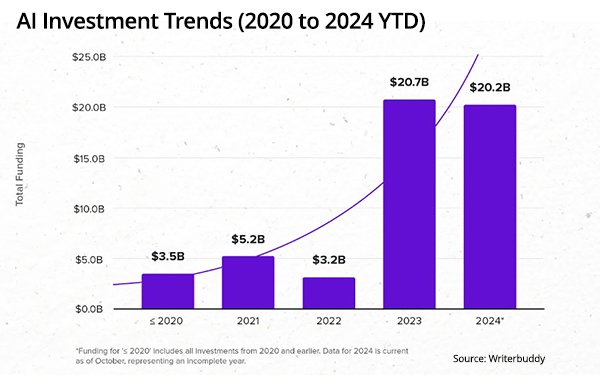
Former Google employees have had a profound
influence on artificial intelligence. Fourteen of the top 50 AI startups have roots in Google. These companies have been co-founded and led by former employees.
They have raised about $14.7
billion, accounting for nearly 28% of the funding for the top AI startups, and have a combined valuation of $71.60 billion.
The companies created include Anthropic, Perplexity, Mistral,
Cohere, Glean, Character.ai, Cresta, Anyscale, Adept, Pika, Replicate, Cleanlab, Cradle, and Kumo.
WriterBuddy.ai, which is responsible for the data, estimates that AI investment stood at $3.5 billion in 2020 and even a bit earlier, when investors were just beginning to see the potential.
Funding grew to $5.2 billion in 2021, as AI use cases gained traction across industries.
advertisement
advertisement
There was a slight dip to $3.2 billion by 2022, likely due to market uncertainty or economic
challenges, and then it took off.
The top 50 AI companies raised $52.8 billion as of 2024, with a 600% surge in 2023 to $20.7 billion compared with 2020, according to data.
Sectors
that dominated AI funding in 2024 may surprise many. AI infrastructure and models took 67.27%, about $35.5 billion. Data and analytics came in at 11.13% or about $5.9 billion. Defense and security
took 7.8%, or about $3.8 billion, while AI search tools took a mere 3.37% -- about 1.8 billion.
Funding overall reached $20.2 billion by October 2024. Overall, the five-year trend highlights a
dramatic increase in funding, driven by advancements in AI and broader acceptance of its role in shaping the future, according to the data.
The study conducted
by WriterBuddy.ai analyzed funding, valuation, and influence trends among 50 top AI companies from the 2024 Forbes AI 50 list. Data was sourced from Crunchbase, PitchBook, as well as news
articles.
The companies were categorized into eight sectors. Key analyses included funding trends, geographic distribution, and ex-Google employee influence. The list focuses on private
companies through October 2024.
Key Findings:
- Total valuation:The collective valuation is $358.37 billion, indicating strong market confidence.
- Top
funded sector:AI Infrastructure & Models led with $35.5 billion, 67% of total. Data & Analytics at $5.9 billion followed, with Defense & Security at $3.8 billion.
- Geographic insights: U.S.-based companies raised $49.4B, 94% of the total. France with $1.3 billion followed, with California companies attracting $47.9 billion. It made California the leading AI
hub.
- Most funded startups: OpenAI raised $21.9 billion, Anthropic raised $9.7 billion, and Databricks raised $4 billion.
- Top unicorns: OpenAI raised $157 billion, while Databricks
raised $43 billion and Anthropic raised $40 billion. Among the top 50 companies, 29 are unicorns.